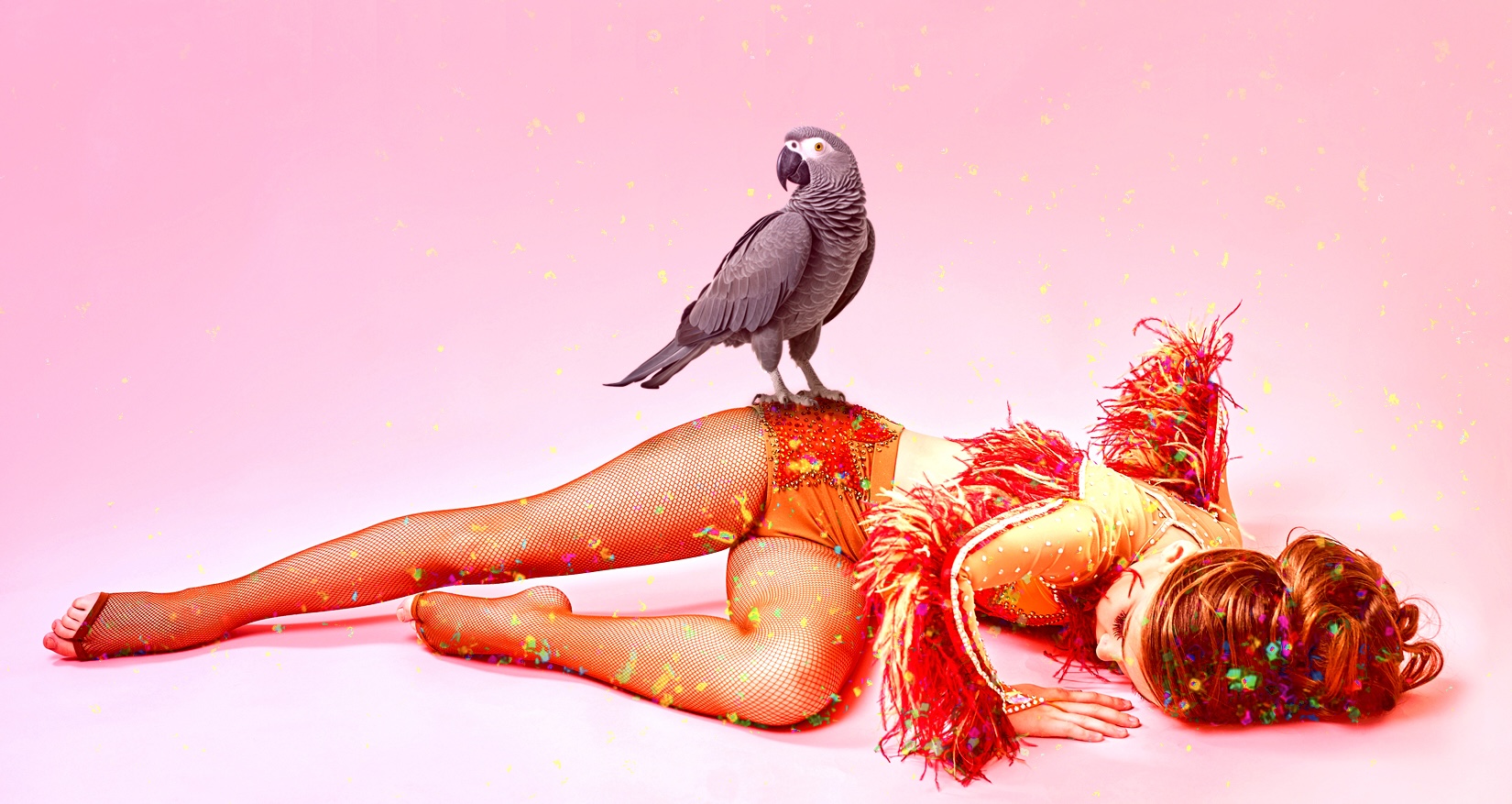
On the Literature of Ambitious Women
Eliana Ramage Recommends Benedict Nguyễn, V.V. Ganeshananthan, Danzy Senna and More
For two of the twelve years it took to write my novel, I didn’t write. When I returned to it, finally, in the early mornings of the pandemic, it felt like coming home. I had, after all, moved back in with my parents. Waking alone in a dark room before the online workday began, writing by a window and with the noise of my before-life stripped away, the writing was enough. Writers, protect your inner life, as Lan Samantha Chang says.
I tried to understand: how had I let myself stop writing those two years? How had I let myself even briefly forget, years-deep into the crazy-making excel charts of which literary magazines had sent form rejections and which had sent good rejections, that this was so precious to me?
The writing was enough, of course. And of course, within days, I caught myself wondering: When will this manuscript be ready to query?
Ambition is humiliating—to me, a person raised in a family where the communal is sacred—because it elevates the needs (God helps us, the wants!) of the individual. It makes public our secret yearnings. To be ambitious is to announce to the world that my selfish pursuits, whatever they are, should be taken seriously in a world with, frankly, bigger fish to fry. I take my writing seriously, but not as seriously as real suffering of real people. At an event at Parnassus Books for her recent novel The Satisfaction Café, Kathy Wang revealed to the audience: “Nobody is waiting for your second novel.”
Nobody is waiting for you to make it as a child star slash professional dancer. Nobody is waiting for you to win the men’s pro indoor volleyball championship. Nobody is waiting for you to circumnavigate the globe in an airplane, or to get through medical school during the Sri Lankan civil war, or to blast off into space.
People do, though, in literature as in life. Alongside these stories of one person’s ambition are the stories of those around them. The parents and siblings and children and partners. The friends and colleagues, the people who inch towards our same dreams—or different dreams, or opposing dreams—alongside us.
My debut novel, To the Moon and Back, is about one woman’s obsessive quest to become the first Cherokee astronaut. Though I once imagined it as a story of singular ambition, it isn’t. It’s a family saga, a mothers and daughters story, a sisters story, and a love story. It’s a queer coming-of-age story. Steph, our aspiring astronaut, is not alone in the world. The women in her life have their own ambitions, their own convictions. While Steph participates in a Mars simulation project, her sister participates in an encampment of Indigenous activists, protesting Steph’s mission. When it comes to the genre of stories about “singular” ambitions, as if they could really stand alone, I’m unsure what that would even entail.
Thankfully, what we have instead are ambition stories that are also stories of people, and everything and everyone they carry with them. Here, some truly beautiful, inventive, and powerful novels and memoirs about ambitious women—singular in desire but breathtakingly expansive in reach:
*
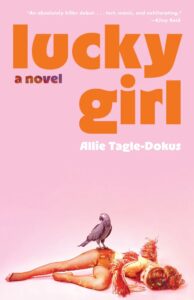
Allie Tagle-Dokus, Lucky Girl
Lucky Girl is a hilarious and heartbreaking exploration of the messy contradictions between art, work, and ambition. Lucy Gardiner needs to become a dancer. Dancing alone in her bedroom won’t satisfy her, especially after Hollywood claims her for a dance competition slash reality TV show. As Lucy fights to achieve her dream, she sacrifices more and more of herself: her time, her friends, and finally her family to make art the masses consume.
Lucy finds a role model and a home with Bruise, an aging pop star on her comeback who like Lucy has given up her childhood to make her dreams a reality. But the closer Lucy is drawn into Bruise’s inner life, the more she sees that Bruise’s greatness is smoke and mirrors, a mirage she will never truly reach, leaving Lucy to ask, if this isn’t success, what is?

Benedict Nguyễn, Hot Girls With Balls
Six and Green are transfeminine, Asian American, internet-famous pro volleyball players—navigating a long-distance relationship through SpaceTime calls, the COVIS pandemic, and the trolls and obsessive fans on Instagraph. As they prepare to play against each other at the championship tournament, the first since COVIS to include live fans, Six and Green manage their personal brands online and the pitfalls of their public and lucrative relationship with each other.
When tragedy strikes close to home, Six and Green are left with not only the tremendous pressure of their pioneering careers and the game itself, but also with the weight and contradiction of what is expected of them. Do they make space to grieve? Publicly or privately? Do they prioritize their own ambition, and what they can control at this peak of their careers, or do they feel called to political action? Are they in step with one another? What does political action mean, in this messy place of obligation, representation, celebrity, and love?
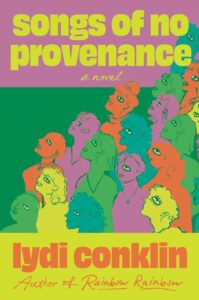
Lydi Conklin, Songs of No Provenance
Joan Vole, an indie folk singer “forever teetering on the edge of fame,” is the art monster to end all art monsters. She’s completely uncompromising, and one of the most insatiable characters I’ve come across. Joan writes songs. All day, all night, hours straight—with little thought to food or hygiene or home or even friends. For example: when her long-time mentee and friend asks to sit down and eat dinner together, Joan is surprised and frustrated. They should be making art or walking—eating a snack on the go, maybe, but never still. The novel isn’t still, either, throwing us into a fast-paced, daring, but tender investigation into the role of ambition in art.
When we meet Joan, the career of her mentee has suddenly ascended beyond hers. She no longer needs Joan’s help. What follows is an onstage sexual act, an all-night cross-country drive to work (to hide) at a writing camp for high schoolers, and a choice—to either engage seriously with where her need to create has brought her, or to leave it all behind.
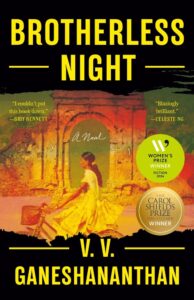
V.V. Ganeshananthan, Brotherless Night
I have been shouting about this novel from the rooftops since it came out two and a half years ago, and I’m nowhere near done. Set in the 1980s during Sri Lanka’s civil war, 16-year-old Sashi dreams of becoming a doctor. But as the war tears at civilian life, Sashi’s four brothers and their friend K are pulled into the conflict. Now Sashi’s desire to get through medical school must maneuver itself alongside her other needs: to be safe, to keep her loved ones safe, and to try to see the end of it without doing harm.
One of many questions raised by this story: who “gets to” protect their own ambition? Another question: what obligations come with our abilities? In one scene, Sashi is asked to volunteer at a field hospital for the militant Tamil Tigers. In another, her medical school professor invites her to join a dangerous project, risking her life in pursuit of documenting all human rights violations, from all sources.

Danzy Senna, Colored Television
Jane Gibson is a novelist and an untenured creative writing professor, unsatisfied with the material life she and her husband have been able to provide as working artists. She’s class-conscious, obsessive, and desperate to finally complete her second novel and make some real money for her writing. After her first novel was published, Jane’s agent advised that she finish a second book as soon as possible: “Don’t make it too ambitious. Just bang it out and get it over with.”
Now, nine years later, that second novel is a centuries-spanning epic, dubbed “the mulatto War and Peace” by Jane’s husband Lenny. It’s also unsellable. In a last-ditch effort to finally find success, Jane hides her novel’s rejection from Lenny, a stickler-for-purity artist, before embarking on a sharp, funny, page-turning hustle to pitch and develop (and get paid for!) a TV show—specifically, for the “Jackie Robinson of biracial comedies.”
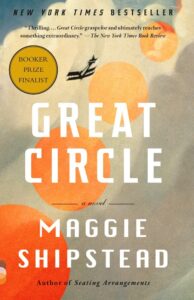
Maggie Shipstead, Great Circle
Marian Graves is a pioneering aviator when few women (and few people!) flew, and she’s determined to circumnavigate the globe. Hadley Baxter is a modern-day Hollywood actor, cast to play Marian in a movie while her own life is going off the rails. This is an epic novel about, yes, ambition. It’s also about self-determination, as Marian and Hadley wrestle with their individual desires in two different timelines, each with its own expectations for women and their dreams.
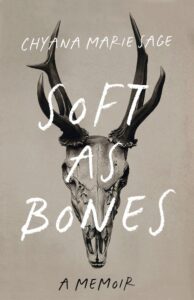
Chyana Marie Sage, Soft as Bones
Chyana Marie Sage, a Cree, Métis and Salish poet and writer from Edmonton, Alberta, recounts a deeply emotional story of survival—from her childhood with an abusive and drug-dealing father, to her own journey through alcohol, drugs, and abusive partners. In telling her story she investigates her family’s story, tracing their legacy through a history of violence against Indigenous people—with stories like that of her father’s father, who was removed from his family by the residential school system. Alongside this darkness, Sage shares the traditions of her people that save her life, braiding her personal story together with Cree stories, and with the ceremonies that have carried her through times of need.
This is a story of personal ambition, but it does not insist on its apartness from family. In one particularly moving scene, Sage sits on her bed with her mother and asks to interview her for the memoir. Sage’s specific desire to write does not announce itself at first, when she is a child in crisis. Wisely, Sage takes us with her on a path of understanding the legacy she has inherited—before making space for her own future.

Hala Alyan, I’ll Tell You When I’m Home
“When the women in my family want something, it multiplies like seeds or bacteria. It infects them. It becomes an obsession. They become blinded by their desire: for a desert or accent, for a man, for a child. Their desire, soured, turns into rage; the women in my family wear their resentments like bracelets. They will tell you all about them. They will ruin dinner.”
A smart, immersive, and life-affirming memoir set in the space between generations: those who have passed and those who aren’t yet. Marking time through the months of a pregnancy, waiting for a baby carried by a surrogate in another country, Palestinian American poet and writer Hala Alyan tells stories, like Scheherazade, towards survival. Her husband wants to leave, her baby is readying for the world, and Alyan investigates her own desires: “To finish what my grandparents had started: to find a land, to break it open, to nestle something in it and watch it grow. To have something to show her. Her. Her. Her.”
Ambition can be desire set aside for the individual, a reserved piece of life that is one’s own. But in these pages, Alyan’s ambition reaches outwards. To become a mother to her child, and to reckon with her family’s legacy of displacement: from Palestine, Kuwait, Syria, and Lebanon. Through addiction, recovery, infertility, and, urgently, a search for both selfhood and peoplehood, and towards home.
__________________________________
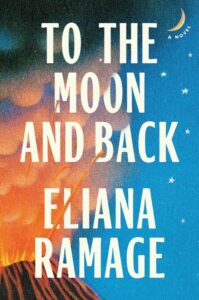
To the Moon and Back by Eliana Ramage is available via Avid Reader Press, an imprint of Simon and Schuster.
Eliana Ramage
Eliana Ramage holds an MFA in fiction from the Iowa Writers’ Workshop. She has received residencies and fellowships from the Kimmel Harding Nelson Center, Lambda Literary, Tin House, and Vermont Studio Center. A citizen of the Cherokee Nation, she lives in Nashville with her family. To the Moon and Back is her first novel.



















